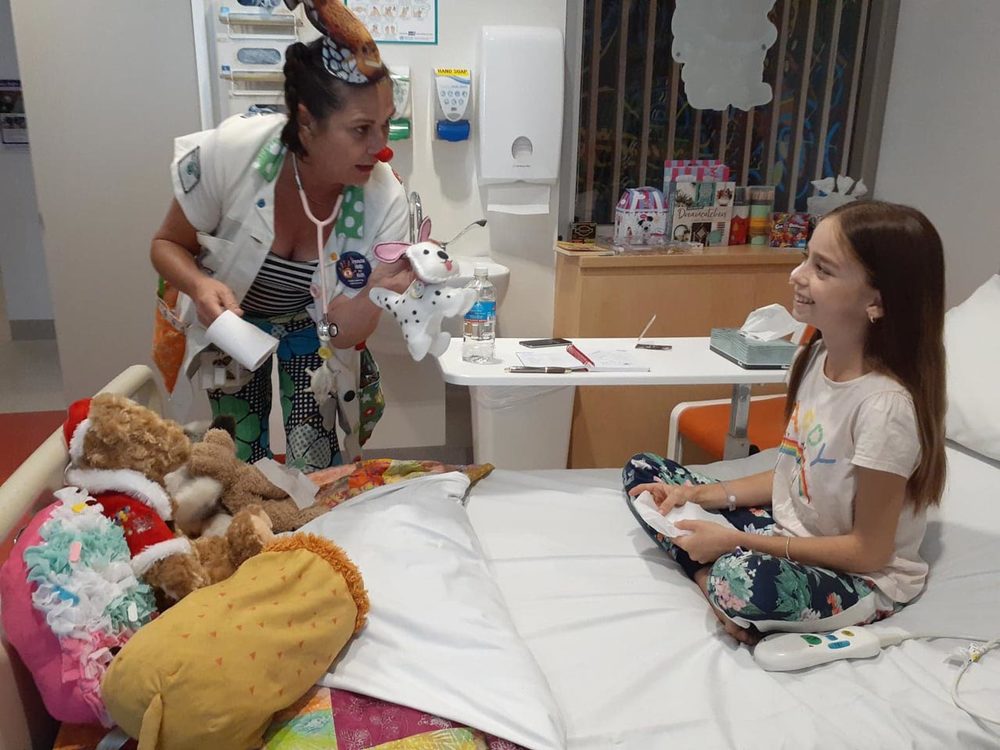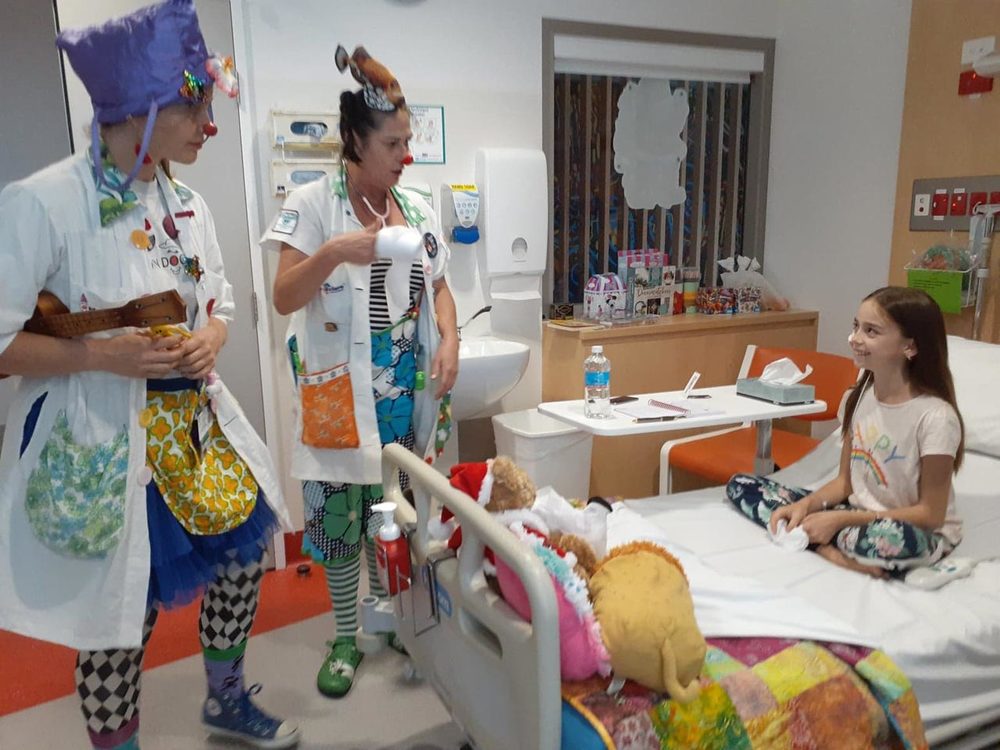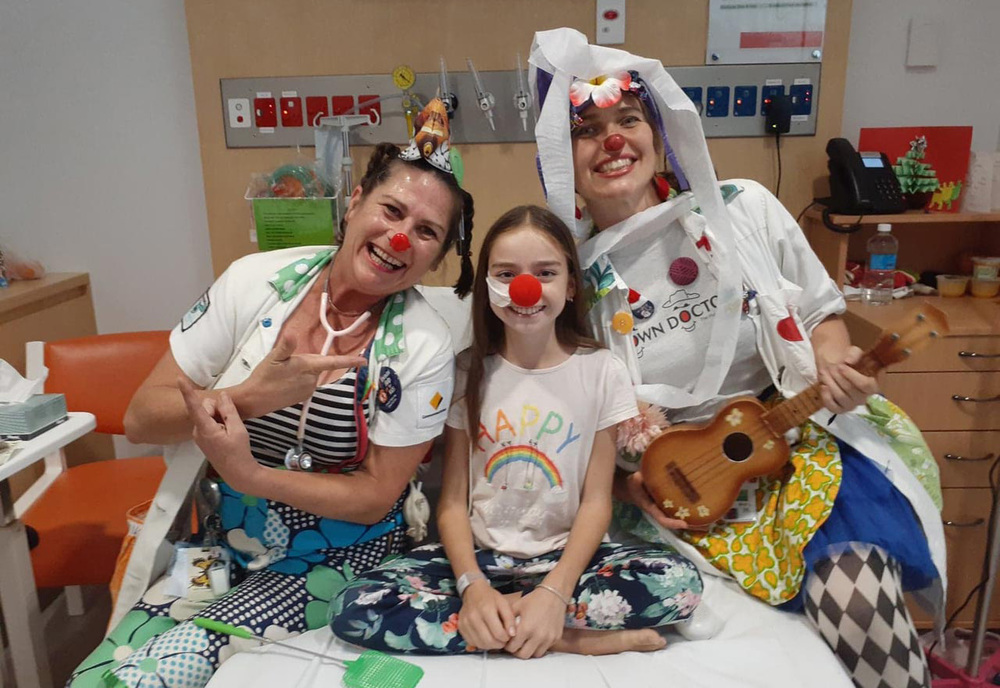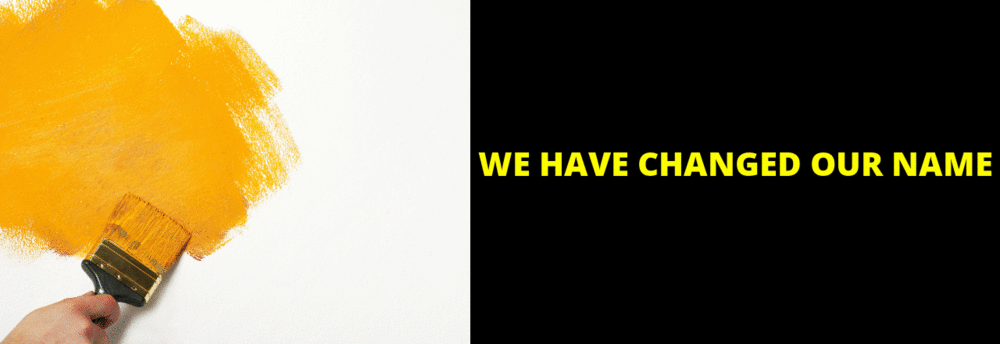SUNDAY PROFILE: Clown Doctor Dr Sniggles (aka Helen Quinlan)
Liina Flynn
21 December 2019, 8:00 PM
 Clown Doctors Dr Buttercup and Dr Sniggles at Lismore Base Hospital.
Clown Doctors Dr Buttercup and Dr Sniggles at Lismore Base Hospital.Once a clown, always a clown: Dr Sniggles (aka Helen Quinlan) was a Coca Cola yoyo champion when she was young.
So, it’s not too surprising that she went on to become Australia’s first female Clown Doctor.
Dr Sniggles - in charge of sneezes and giggles - has been bringing smiles to the folk at Lismore Base Hospital for 15 years now, as a Clown Doctor with national charity, The Humour Foundation.
Clown Doctors have a mission to spread doses of fun and laughter to people in need across Australia and improve the quality of life for people in hospitals, health and aged care facilities.
With a motto of ‘laughter is the best medicine’, their skills in improvisation, slapstick, magic, music, puppetry, singing, juggling and using found objects to bring humour to a situation always helps to lift people’s spirits.
“Every time I see a squirty toy I want to buy it,” Dr Sniggles said.
“I found a squirty toilet toy once, so I bought 10 of them. You lift the lid and it squirts water.
“Often, I’ll give them to the nurses’ desk, still full of water. When someone sees it, they always want to open it and when they get squirted, it makes the nurses laugh.
“When people who work there are smiling, it passes down the line.”
When she visited Lismore Base Hospital last week with her Clown Doctor partner Dr Buttercup, to celebrate the 15 year anniversary of Clown Doctors being in the hospital, Dr Sniggles pulled out a plastic bendy straw and put it in her armpit and blew on the straw.
The farting noise that came from her armpit made the passing nurses stop and laugh.
See Dr Sniggles trick Dr Buttercup into sitting on a whoopee cushion at Lismore Base Hospital last week: https://www.facebook.com/LismoreApp/videos/2707271165997886/

Dr Sniggles visits 10 year old Phoenix at Lismore Base Hospital. Read the story: Clown Doctors bring the whoopee to a hospital Christmas
Passion
Since she had her first meeting in 1996 with co-founders of the Humour Foundation, Jean Paul Bell and Dr Peter Spitzer, Dr Sniggles knew being a Clown Doctor was the perfect job for her.
But her passion for clowning started many years before that.
“As a child, I was never very good at sitting still and I was fascinated with jugglers,” Dr Sniggles said.
“I had a perfect childhood to be a clown. I had a crazy dad in a busy household - and it’s common that clowns are the youngest in the family because they have an audience.”
Dr Sniggles had her first clown costume made in grade one at school and remembers loving the comedy of Charlie Chaplin, The Three Stooges, Lucille Ball and the Harlem Globetrotters.
Dr Sniggles picked up a lot of clowning skills over the years, from learning diablo and unicycle, to magic tricks and juggling.
“I never got into juggling until I was living in London working as a lifeguard in a swimming pool,” she said.
“One of my mates told me one of the swimmers was in Guinness Book of Records for juggling, so I would always bring my three tennis balls and leave them near the end of his lane and I asked him to teach me.
“As we progressed, he took me on the tube and showed me how to juggle five balls in a moving carriage and how to earn money busking – but I still didn’t have the confidence.”
When she came back to Australia in 1994, Dr Sniggles began working in a club in Kings Cross and used to juggle shot glasses – and she got noticed.
“I was told there was a bushfire fundraiser and they were looking for a reliable clown, so I went,” she said.
“I was so nervous I got off the stage in 30 seconds, but they told me I was fantastic and asked to perform at a party. Then that turned into being offered the half time entertainment slot at the Cronulla Sharks’ games.
“So, I got over my fear of performing and started my own kids’ parties and it grew into contracts with shopping centres and corporate parties.
“I made a living out of it at the time and I worked hard. But in this industry, you are busy when everyone else is on holidays like at new year – and it wasn’t conducive to being single mother.”
Her son, now 24 years old, was discovered to be on the spectrum and Dr Sniggles said she had a difficult time raising him in Sydney.
“I wanted to spend more time with him and was spending a lot of money on therapies, so I decided to move up to the Northern Rivers,” she said.
“We moved up here in 2002 and it was the best move – my son loves it here and loves animals, so we have a house full of those.”

Toilet paper becomes a funny situational prop for Dr Sniggles and Dr Buttercup with 10 year old Phoenix.
From party clown to clown doctor
When Dr Sniggles first met Jean Paul Bell in 1996 to talk about being a clown in hospitals, she said “a lot of people were not interested in it”.
“But I thought it was the best idea ever,” she said.
“I’d been sick as a kid and spent a lonely year, ill in bed - and when I was 12, I had appendicitis and was in hospital.
“In those days, there were no specific kids’ wards. I was in a ward from the war time with a lino floor and an old man coughing – it was pretty scary.
“When Jean Paul talked about having Clown Doctors, I saw how important it was to have this and help make people in hospital feel empowered.
“It was the perfect job for me.”
Then, she started clowning in the childrens’ hospital in Randwick in 1997.
“The Humour Foundation had to approach the hospital and convince them why clowns were needed - and they let us have a go,” she said.
“We needed to create an Australian Clown Doctor, which was different to the American or Austrian ones.
“In America, the clowns have big, white faces – which comes from the circus era at the turn of last century, where the audience couldn’t get close and the clowns had to exaggerate facial movements.
“But we wear little makeup and only a little nose, so kids see that we are human and not scary.”
There are now 67 Clown Doctors and 16 Elder Clowns working in Australia with the Humour Foundation, in 23 different hospitals.
“The Elder Clowns work in aged care and dress as older people wearing 50s and 60s era clothes and spread poetry dance, giving purpose to the lives of people that don’t get many visitors,” she said.

Clown Doctors Dr Sniggles and Dr Buttercup with 10 year old Phoenix in Lismore Base Hospital.
Clown Skills
Dr Sniggles said it’s a “weird set of skills” you need to be a Clown Doctor.
“You need to be empathic, compassionate, caring, fast thinking and play with things in situations that are not always happy and make light of it,” she said.
Working in partnership with medical professionals, clown doctors help to put sick children and adults at ease in an often strange and unfamiliar environment, helping divert and calm them during procedures.
“We often help kids understand the procedures they are going through by using toys and found objects,” she said.
“I might use a hand towels to make a flower for people who haven’t got flowers - one girl sat bolt upright in bed when I showed her how to make a flower.
“Music is important too – we use ukuleles and kazoos and we work with everyone in the hospital.
“Every single person is important – the cleaner, admin and security guards and parents.
“It’s important to give attention to the siblings of a sick child too – often they miss out on attention from their parents because of their sick brother or sister.
“Christmas can be a tough time when people are in hospital and their families are not around.
“Older patients are often stressed and we’ll ask them for commentary on our fashion, or take them on a virtual holiday where we get them to close their eyes and imagine they are on a cruise boat, while we play ukulele.
“It’s often about empowering a person who is not in control of what’s happening to them and make them feel they have some control over their lives.
“I sometimes use a bendy man and gives it to kid and ask them to move it around and I act out the movement - they love it.
“They might turn it or hit it on the head and I’ll sing - they have control of that - give them power and they will take it.
“Parents have said they haven’t seen a smile like that forever.
“It doesn’t take much to be kind.
“We were in the emergency department once and my Clown Doctor partner started singing and the old lady in bed sat upright.
“The doctor watched and said they couldn’t get that result from her – so the effect is noticed from every level.”
International research has shown that laughing produces both physiological and psychological benefits. Doses of humour can help people relax, relieve fear and stress, boost the immune system and help recovery.
The work of The Humour Foundation is funded only by public donations and sponsorship.
They also have a giving program where people are asked to give a small regular donation to keep the Clown Doctors spreading smiles.
Recently, the Clown Doctors went on an outreach tour to rural hospitals in places like Goondiwindi, thanks to sponsors of The Humour Foundation’s programs.
“No one should miss out on laughter – it’s just as important when they live in the country,” Dr Sniggles said.
Training
While there’s a certain set of skills needed to be a Clown Doctor, there’s also a lot of on the job training.
“Clown Doctors attend an annual conference where we share skills and get some high standard training,” Dr Sniggles said.
“We are trained in infectious diseases control, hand washing, communication and improvisational clown skills.
“We learn the do’s and don’ts of working with people on the spectrum – about not surprising people and checking with their parents - they know their kid’s capabilities and the toys they love.
“One year we had to work in teams and learn to wax lyrical as we created a hip hop song together.
“We share our experiences and support each other as well as share tricks.
“We were shown how to make a rubber glove into a shark and a sumo wrestler face.
“My son gets sick of listening to me always learning new songs for kids,” she laughed.
With her ukulele and kazoo, and a pocket full of unusual objects, Dr Sniggles intends to keep doing her rounds of Lismore Base Hospital, doing what she loves best – clowning.
Donate
Relying on sponsorship and community support, the Clown Doctors program is looking for more people to donate money to allow them to expand their special service, which they provide to hospitals free of charge.
They hope that in future, they can be on call every day in every hospital to spread the healing laughter.
To find out more, or to donate to The Humour Foundation and help the national charity deliver the positive health benefits of humour to the Australian community, visit http://www.humourfoundation.org.au

